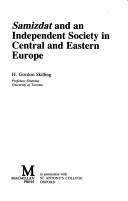| Listing 1 - 10 of 17 | << page >> |
Sort by
|

ISBN: 033343577X Year: 1989 Volume: vol *9 Publisher: London Macmillan
Abstract | Keywords | Export | Availability | Bookmark
 Loading...
Loading...Choose an application
- Reference Manager
- EndNote
- RefWorks (Direct export to RefWorks)
Sociology of policy --- Political systems --- Political sociology --- Eastern and Central Europe --- 323.22 --- Communication --- -Freedom of information --- -Underground literature --- -#SBIB:328H220 --- #SBIB:328H27 --- #SBIB:324H73 --- Clandestine literature --- Illegal literature --- Literature, Underground --- Literature --- Freedom of information --- Information, Freedom of --- Liberty of information --- Right to know --- Civil rights --- Freedom of speech --- Intellectual freedom --- Telecommunication --- Communication, Primitive --- Mass communication --- Sociology --- Kritische ingesteldheid tegenover de staat. Kritiek op de staat. Politieke aktiegroepen. Contestatie. Dissidenten. Maatschappijkritiek. Ontevredenheid, onrust, vetrouwenskrisis in politiek --- Political aspects --- -History and criticism --- Instellingen en beleid: Oost-Europa: comparatief / diverse landen --- Instellingen en beleid: Midden- en Centraal Europa: algemeen --- Politieke verandering: oppositie en minderheid, protest, politiek geweld --- Law and legislation --- Europe, Eastern --- East Europe --- Eastern Europe --- Politics and government --- -323.22 --- 323.22 Kritische ingesteldheid tegenover de staat. Kritiek op de staat. Politieke aktiegroepen. Contestatie. Dissidenten. Maatschappijkritiek. Ontevredenheid, onrust, vetrouwenskrisis in politiek --- -Sociology of policy --- -Communication --- Underground literature --- #SBIB:328H220 --- History and criticism --- Europe [Eastern ] --- 1945-1989 --- Communication - Political aspects - Europe, Eastern. --- Freedom of information - Europe, Eastern. --- Underground literature - Europe, Eastern - History and criticism. --- Europe, Eastern - Politics and government - 1945-1989.
Book
ISBN: 0333510828 Year: 1991 Publisher: Basingstoke Macmillan
Abstract | Keywords | Export | Availability | Bookmark
 Loading...
Loading...Choose an application
- Reference Manager
- EndNote
- RefWorks (Direct export to RefWorks)
History of Eastern Europe --- National movements --- anno 1900-1999 --- Czechoslovakia --- History --- -Congresses. --- Chekhoslovakii︠a︡ --- Czechosłowacja --- Tsjechoslowakije --- Československá socialistická republika --- Czechoslovak Socialist Republic --- Chekhoslovat︠s︡kai︠a︡ Sot︠s︡ialisticheskai︠a︡ Respublika --- Čehoslovakija --- CSRS --- ČSSR --- Tschechoslowakei --- Tsjekkoslovakia --- Tsechoslobakia --- Tshīkūslūfākiyā --- Československo --- Československa republika --- Tchécoslovaquie --- Csehszlovákia --- Ceho-Slovacia --- ČSR --- Chieh-kʻo-ssu-lo-fa-kʻo --- Chieh-kʻo-ssu-lo-fa-kʻo she hui chu i kung ho kuo --- C.S.R.S. --- Č.S.S.R. --- Č.S.R. --- Cecoslovacchia --- Checoslovaquia --- Tschechische Sozialistische Republik --- Ts'ekhoslovaḳyah --- Czech and Slovak Federal Republic --- Česká a Slovenská Federativní Republika --- Česká a Slovenská Federatívna Republika --- Cseh-Szlovákia --- ČSFR --- ChSSR --- ChSFR --- Republika československa --- Češkoslovaška --- Czecho-Slovakia --- Czech Republic --- Slovakia --- Tsechoslovakia
Book
ISBN: 0043210260 9780043210260 Year: 1981 Publisher: London Allen and Unwin
Abstract | Keywords | Export | Availability | Bookmark
 Loading...
Loading...Choose an application
- Reference Manager
- EndNote
- RefWorks (Direct export to RefWorks)
Civil rights --- -Human rights --- -323 <437> --- 342.7 <437> --- 943.7 --- 800 Collectie Vlaams Vredesinstituut --- 821.5 Mensenrechten --- 858.1 Politiek geweld --- 884.1 Oost-Europa --- Basic rights --- Civil rights (International law) --- Human rights --- Rights, Human --- Rights of man --- Human security --- Transitional justice --- Truth commissions --- Civil liberties --- Constitutional rights --- Fundamental rights --- Rights, Civil --- Constitutional law --- Political persecution --- Law and legislation --- Droits de l'homme --- Bürgerrechtsbewegung. --- Droits de l'homme - Tchécoslovaquie. --- Tschechoslowakei. --- Charta 77 --- Movement --- Czechoslovakia --- 323 <437>
Book
ISBN: 0691052344 1322883769 0691617007 0691644187 1400871158 0691100403 Year: 1976 Publisher: Princeton (N.J.): Princeton university press
Abstract | Keywords | Export | Availability | Bookmark
 Loading...
Loading...Choose an application
- Reference Manager
- EndNote
- RefWorks (Direct export to RefWorks)
For about eight months in 1968 Czechoslovakia underwent rapid and radical changes that were unparalleled in the history of communist reform; in the eight months that followed, those changes were dramatically reversed. H. Gordon Skilling provides a comprehensive analysis of the events of 1968, assessing their significance both for Czechoslovakia and for communism generally. The author's account is based on all available written sources, including unpublished Communist Party documents and interviews conducted in Czechoslovakia in 1967, 1968, and 1969. He examines the historical background, the main reforms and political forces of 1968, international reactions, the Soviet intervention, and the experiment's collapse, concluding with his reasons for regarding the events of the Prague spring as a movement of revolutionary proportions.The author's account is based on all available written sources, including unpublished Communist Party documents and interviews conducted in Czechoslovakia in 1967, 1968, 1969. He examines the historical background, the main reforms and political forces on 1968, international reactions, the Soviet intervention, and the experiment's collapse, concluding with his reasons for regarding the events of the Prague spring as a movement of revolutionary proportions.Originally published in 1976.The Princeton Legacy Library uses the latest print-on-demand technology to again make available previously out-of-print books from the distinguished backlist of Princeton University Press. These editions preserve the original texts of these important books while presenting them in durable paperback and hardcover editions. The goal of the Princeton Legacy Library is to vastly increase access to the rich scholarly heritage found in the thousands of books published by Princeton University Press since its founding in 1905.
-Czechoslovakia --- Czechoslovakia --- History --- Politics and government --- HISTORY / Russia & the Former Soviet Union. --- Absolute war. --- Activism. --- Aleksandr Solzhenitsyn. --- Alexander Dubcek. --- Anti-Party Group. --- Anti-bureaucratic revolution. --- Anti-communism. --- Anti-imperialism. --- Bourgeois nationalism. --- Bratislava. --- Brezhnev Doctrine. --- Censorship. --- Censure. --- Central Committee. --- Chronicle of Current Events. --- Comecon. --- Communist International. --- Communist Party of Slovakia. --- Controversial discussions. --- Counter-revolutionary. --- Criticism. --- Czechoslovakia. --- Czechs. --- Days of May. --- De-Stalinization. --- Dean Rusk. --- Demagogue. --- Democratization. --- Diktat. --- Economic democracy. --- Ernest Gellner. --- Ferdinand Peroutka. --- Flexible response. --- Foreign policy. --- German occupation of Czechoslovakia. --- Hungarian Revolution of 1956. --- Imperialism. --- Imre Nagy. --- János Kádár. --- Khrushchevism. --- Little Entente. --- Market socialism. --- Marxism–Leninism. --- Mehmet Shehu. --- Military occupation. --- Motion of no confidence. --- Nationality. --- Nazi propaganda. --- New Course. --- New Departure (Democrats). --- New Economic Policy. --- New class. --- Nonviolent revolution. --- Original position. --- Ostpolitik. --- Peaceful coexistence. --- Police action. --- Political party. --- Politics. --- Popular sovereignty. --- Prague Spring. --- Presidium. --- Proletarian internationalism. --- Protectionism. --- Public diplomacy. --- Quiet Revolution. --- Reformism. --- Reprisal. --- Revisionism (Marxism). --- Revival Process. --- Revolution. --- Robert C. Tucker. --- Samizdat. --- Slovak National Council. --- Slovakia. --- Slovaks. --- Socialism with a human face. --- Socialist Unity Party of Germany. --- Socialist state. --- Sovereignty. --- Soviet Empire. --- Soviet Union. --- Stalinism. --- Statute. --- Subversion. --- Superiority (short story). --- Svazarm. --- Svoboda (political party). --- That Justice Be Done. --- The Future of Socialism. --- The Two Thousand Words. --- Titoism. --- Untouchability. --- Veto. --- Václav Havel. --- War. --- Warsaw Pact. --- West Germany. --- World Trade Organization. --- Yevgeny Yevtushenko.

ISBN: 1282864297 9786612864292 0773574182 9780773574182 088629357X 9780886293574 9781282864290 661286429X Year: 2000 Publisher: Montreal Ithaca
Abstract | Keywords | Export | Availability | Bookmark
 Loading...
Loading...Choose an application
- Reference Manager
- EndNote
- RefWorks (Direct export to RefWorks)
Gordon Skilling writes candidly of each way station in this personal odyssey: the idealism of his student years at the University of Toronto and Oxford; his presence in Czechoslovakia on the eve of the Nazi, and later Soviet, invasions; his opposition to the Marshall Plan, NATO, and U.S. intervention in Korea; the effect of McCarthyism on his academic life; his involvement with the Czech and Slovak dissident movements and finally the Velvet Revolution. The Education of a Canadian also captures conversations with writers, journalists, scholars, and myriad friends throughout Russia and Eastern Europe (including Havel, Djilas, and Sakharov), making this history a distinctly human yet forceful document of profound humanity and international scope.
Communism --- Scholars --- Political activists --- College teachers --- Communisme --- Savants --- Activistes --- Professeurs (Enseignement supérieur) --- Activists, Political --- Persons --- Political participation --- Learning and scholarship --- History --- Histoire --- Biographies. --- Skilling, H. Gordon --- Skilling, Harold Gordon, --- Skilling, Harold Gordon --- Skilling, Gordon, --- Czechoslovakia --- Tchécoslovaquie --- Politics and government --- Politique et gouvernement --- Professeurs (Enseignement superieur) --- Tchecoslovaquie
Book
Year: 1966 Publisher: Toronto University Press
Abstract | Keywords | Export | Availability | Bookmark
 Loading...
Loading...Choose an application
- Reference Manager
- EndNote
- RefWorks (Direct export to RefWorks)
Book
Year: 1964 Publisher: [Toronto] : University of Toronto Press,
Abstract | Keywords | Export | Availability | Bookmark
 Loading...
Loading...Choose an application
- Reference Manager
- EndNote
- RefWorks (Direct export to RefWorks)
Communism --- Communisme --- Europe, Eastern --- Europe de l'Est --- Politics and government. --- Politique et gouvernement
Book
Year: 1970 Publisher: New York : Crowell,
Abstract | Keywords | Export | Availability | Bookmark
 Loading...
Loading...Choose an application
- Reference Manager
- EndNote
- RefWorks (Direct export to RefWorks)
Communism --- Communist state --- Communisme --- Etat socialiste --- Europe, Eastern --- Europe de l'Est --- Politics and government --- Politique et gouvernement
Book
Year: 1945 Publisher: Toronto Ryerson
Abstract | Keywords | Export | Availability | Bookmark
 Loading...
Loading...Choose an application
- Reference Manager
- EndNote
- RefWorks (Direct export to RefWorks)
Book
Year: 1964 Publisher: Toronto University of Toronto
Abstract | Keywords | Export | Availability | Bookmark
 Loading...
Loading...Choose an application
- Reference Manager
- EndNote
- RefWorks (Direct export to RefWorks)
| Listing 1 - 10 of 17 | << page >> |
Sort by
|

 Search
Search Feedback
Feedback About UniCat
About UniCat  Help
Help News
News